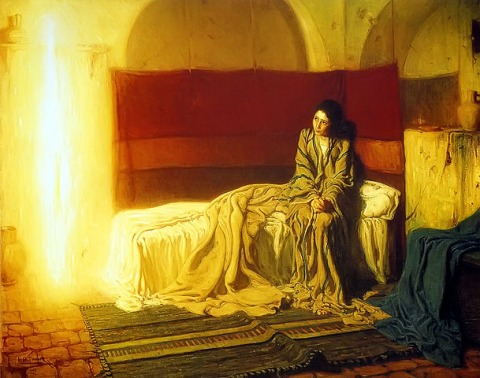
By the lights of the popular culture, the weeks up to Christmas are “the Christmas season” when everyone is supposed to be jolly. Those who cannot rouse themselves to hilarity are often despondent. They think there is something wrong with them.
But according to the liturgical calendar of the Church, the popular culture has it backwards. The season of Christmas doesn’t begin until Christmas. The season through which we have been passing and which ends with tonight’s Vigil is Advent, and it is a penitential season. Its keynote is not hilarity but longing -- longing that is quiet and expectant, but unfulfilled.
It is not unfaithful to confess that we are unfulfilled, and the pretense of fulfillment is not what makes us happy. St. Paul spoke searchingly of how we “groan” in the longing that what is mortal in us may be “swallowed up by life.” Yet this is the same Paul who counsels us to rejoice. How is that possible?
This question, which seems so hard, is really easy. Even the fact that we mourn is a reason for joy. For how could we sorrow at all, if we were merely evolved dirt? If Darwin got it right, no traits should persist in the genome unless they have adaptive value. That obviously fails to fit the facts. If we were perfectly adapted to the way of this world, we would not grieve when dear ones died, but go right on to the next thing. We would not experience strange longings for we know not what that are not to be found in this life. We would not even have consciences, for whatever we desired would be good – just in the sense that we desired it. Then what is the problem? Have there not yet been enough millions of years to put us right? Surely there have been. Plainly we are not made for this world – not even by natural selection. Then we are made for another.
I defy any atheist to pretend that he does not know what I am talking about. When we behold the visible beauties of this world, our spirits soar. Yet who could deny the sweet piercing pain in that transport? The greater the visible beauty we see, the greater the longing for an invisible Beauty that we do not see, whether or not we know or speak its name. The difference between the Christian and the atheist lies not in our longings, but in our theologies. His theology cannot account for what we both feel. My theology can.
And so when I reflect on this vale of tears, I cannot help but be jubilant. If it were really all there were, then I could not even recognize it as a vale of tears; I would be at home in it. Blessed are the discontented. Blessed are they who weep. Blessed are they who lay aside their satisfactions for the Creator of their longings, for they will be satisfied. Rejoice!